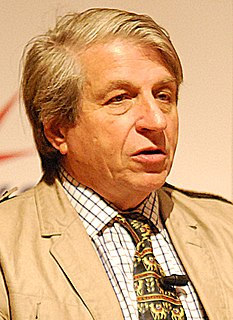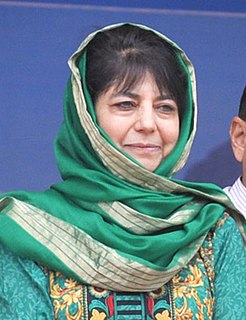A Quote by Salman Rushdie
In an ideal world, you could reunite the Pakistan-occupied part of Kashmir with the Indian-occupied part and restore the old borders. You could have both India and Pakistan agreeing to guarantee those borders, demilitarise the area, and to invest in it economically. In a sane world that would happen, but we don't live in a sane world.
Related Quotes
India had barely become independent, in 1947, when Pakistan invaded Kashmir, which at the time was ruled by a maharajah. The maharajah fled, and the people of Kashmir, led by Sheikh Abdullah, asked for Indian help. Lord [Louis] Mountbatten, who was still governor general, replied that he wouldn't be able to supply aid to Kashmir unless Pakistan declared war, and he didn't seem bothered by the fact that the Pakistanis were slaughtering the population.
9/11 was a signal that we were living in a new world - a world of interdependence, a world in which people could attack the United States not from the outside, but from the inside. It was a sign that the United States, the most powerful country in the world, could watch the cathedral of capitalism at the Trade Center and the heart of its defense at the Pentagon be struck internally, not really across borders, so that borders don't matter anymore.
Pakistan is alarmed by the rising Indian influence in Afghanistan, and fears that an Afghanistan cleansed of the Taliban would be an Indian client state, thus sandwiching Pakistan between two hostile countries. The paranoia of Pakistan about India's supposed dark machinations should never be underestimated.
The issue of Kashmir is both political and emotional in nature. Any pragmatic and lasting solution needs India and Pakistan sitting together on a table and discussing a solution that addresses the aspirations of Kashmiris and does not compromise the territorial integrity of either India or Pakistan.
Now I don't have to explain to the world about India's position. The world is unanimously appreciating India's position. And the world is seeing that Pakistan is finding it difficult to respond. If we had become an obstacle, then we would have had to explain to the world that we are not that obstacle. Now we don't have to explain to the world. The world knows our intentions. Like on the issue of terrorism, the world never bought India's theory on terrorism. They would sometime dismiss it by saying that it's your law and order problem.
Pakistan always seems to have a lot of political complexities and political challenges. But Pakistan is important for a number of reasons. Primarily, it is a nuclear power. And if, in fact, al Qaeda and Taliban, which are in Pakistan and causing a lot of tragedies and deaths in Pakistan - if they would ever somehow have real influence and control of that government, then we [world] really have a problem.
The world I grew up in had both a literal and mythological quality. We were on the borders of several worlds - the larger black world bordered us on one side. More distantly, there was the larger white world. We interacted with some, but not others. If you think of it as an internal geography, it is a land, a contested space with these very charged historical, cultural, and emotional borders.





































